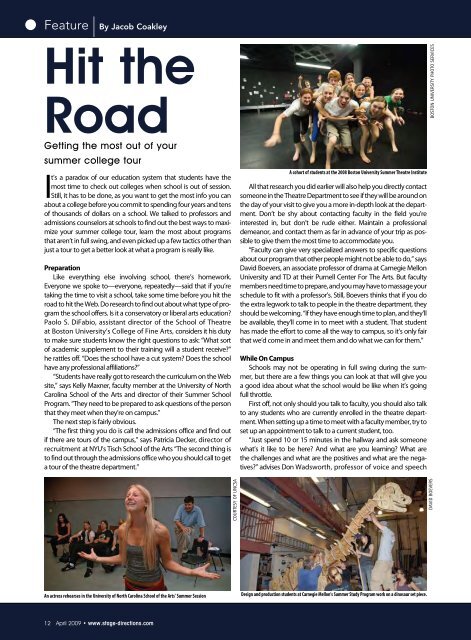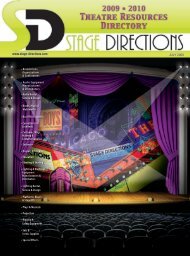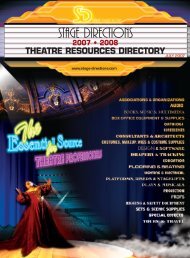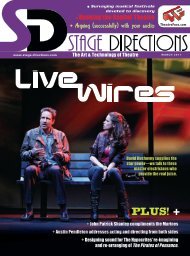Download a PDF - Stage Directions Magazine
Download a PDF - Stage Directions Magazine
Download a PDF - Stage Directions Magazine
Create successful ePaper yourself
Turn your PDF publications into a flip-book with our unique Google optimized e-Paper software.
Feature<br />
|<br />
By Jacob Coakley<br />
Hit the<br />
Road<br />
Getting the most out of your<br />
Boston University Photo Services<br />
summer college tour<br />
It’s a paradox of our education system that students have the<br />
most time to check out colleges when school is out of session.<br />
Still, it has to be done, as you want to get the most info you can<br />
about a college before you commit to spending four years and tens<br />
of thousands of dollars on a school. We talked to professors and<br />
admissions counselors at schools to find out the best ways to maximize<br />
your summer college tour, learn the most about programs<br />
that aren’t in full swing, and even picked up a few tactics other than<br />
just a tour to get a better look at what a program is really like.<br />
Preparation<br />
Like everything else involving school, there’s homework.<br />
Everyone we spoke to—everyone, repeatedly—said that if you’re<br />
taking the time to visit a school, take some time before you hit the<br />
road to hit the Web. Do research to find out about what type of program<br />
the school offers. Is it a conservatory or liberal arts education?<br />
Paolo S. DiFabio, assistant director of the School of Theatre<br />
at Boston University’s College of Fine Arts, considers it his duty<br />
to make sure students know the right questions to ask: “What sort<br />
of academic supplement to their training will a student receive?”<br />
he rattles off. “Does the school have a cut system? Does the school<br />
have any professional affiliations?”<br />
“Students have really got to research the curriculum on the Web<br />
site,” says Kelly Maxner, faculty member at the University of North<br />
Carolina School of the Arts and director of their Summer School<br />
Program. “They need to be prepared to ask questions of the person<br />
that they meet when they’re on campus.”<br />
The next step is fairly obvious.<br />
“The first thing you do is call the admissions office and find out<br />
if there are tours of the campus,” says Patricia Decker, director of<br />
recruitment at NYU’s Tisch School of the Arts “The second thing is<br />
to find out through the admissions office who you should call to get<br />
a tour of the theatre department.”<br />
A cohort of students at the 2008 Boston University Summer Theatre Institute<br />
All that research you did earlier will also help you directly contact<br />
someone in the Theatre Department to see if they will be around on<br />
the day of your visit to give you a more in-depth look at the department.<br />
Don’t be shy about contacting faculty in the field you’re<br />
interested in, but don’t be rude either. Maintain a professional<br />
demeanor, and contact them as far in advance of your trip as possible<br />
to give them the most time to accommodate you.<br />
“Faculty can give very specialized answers to specific questions<br />
about our program that other people might not be able to do,” says<br />
David Boevers, an associate professor of drama at Carnegie Mellon<br />
University and TD at their Purnell Center For The Arts. But faculty<br />
members need time to prepare, and you may have to massage your<br />
schedule to fit with a professor’s. Still, Boevers thinks that if you do<br />
the extra legwork to talk to people in the theatre department, they<br />
should be welcoming. “If they have enough time to plan, and they’ll<br />
be available, they’ll come in to meet with a student. That student<br />
has made the effort to come all the way to campus, so it’s only fair<br />
that we’d come in and meet them and do what we can for them.”<br />
While On Campus<br />
Schools may not be operating in full swing during the summer,<br />
but there are a few things you can look at that will give you<br />
a good idea about what the school would be like when it’s going<br />
full throttle.<br />
First off, not only should you talk to faculty, you should also talk<br />
to any students who are currently enrolled in the theatre department.<br />
When setting up a time to meet with a faculty member, try to<br />
set up an appointment to talk to a current student, too.<br />
“Just spend 10 or 15 minutes in the hallway and ask someone<br />
what’s it like to be here? And what are you learning? What are<br />
the challenges and what are the positives and what are the negatives?”<br />
advises Don Wadsworth, professor of voice and speech<br />
Courtesy of UNCSA<br />
David Boevers<br />
An actress rehearses in the University of North Carolina School of the Arts’ Summer Session<br />
Design and production students at Carnegie Mellon’s Summer Study Program work on a dinosaur set piece.<br />
12 April 2009 • www.stage-directions.com

















